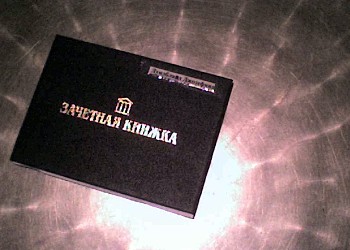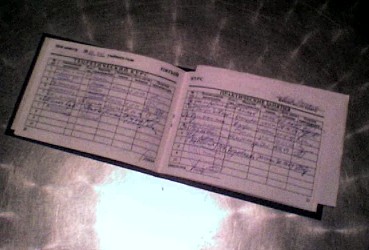Doing it Russian style means doing it «коллективно» [collectively] Posted by josefina on Jan 29, 2010 in Culture, Traditions
The title of today’s post might (actually have been intended to) lead my dear readers’ minds astray. Despite whatever you might have thought that this post was going to be about, let me assure you that «нет, не это я имела в виду» [no, that was not what I had in mind]. What I actually «имела в виду» [had in mind] was something entirely different – the importance of the «коллектив» [collective; group of people] in Russian society and culture. It is not surprising, I guess, that the country which once tried to build «коммунизм» [Communism] would still have some features of the «все за одного, один за всех» [all for one, one for all] type of thinking intact today. How do I know this? you might ask. As a matter of fact, I know this because I learned it while being a part of a «дружный коллектив» [harmonious, united; amicable collective] in Russia during the past year and a half. This united and harmonious collective is the «группа» [group] of students with which I am currently studying «в магистратуре» [in the Master’s program] at Ural State University here in Yekaterinburg. But before telling you of how things are done «коллективно» [collectively] in today’s Russia, I must spend a few words explaining «система высшего обрзазования в Российской федерации» [the system of higher education in the Russian Federation]. I’m not going to tell you EVERYTHING about this, though, both because it is impossible (it is really THAT complicated) and because that is beside the point. What I will focus on today – and through which I will illustrate an important aspect of «коллективность» [fem. ‘collectivity’] – is «сдача экзаменов» [passing of exams] in Russian universities.
The process of passing exams is known as «сдача» in Russian, though you might come to find any of the following translations when looking up this word in the dictionary: lease; surrender; delivery; change, money received back after paying for goods; hit back. It is called «сдача» because of the phrases «сдавать экзамен» [impfv. to TAKE an exam] and «сдать экзамен» [pfv. to PASS an exam].

All students at institutions of higher learning in Russia have the following in their possession: «зачётная книжка» [a student’s record book]. Colloquially it is known as a «зачётка». In order to receive your «диплом» [diploma, certificate given upon completion of a course of study (i.e. high school, university, etc.)] after finishing your education you must turn your «зачётка» in and you’ll never see it again in your life. That’s why this picture is almost sad – soon I will have to part with ‘her’ forever…
At the end of every course in Russian universities you are given a «список вопросов к экзамену» [list of questions for the exam]. It is imperative for you to be aware of the fact that this list is never – as is the general practice in most other countries – given to you at the BEGINNING of a course, but only at the very END of it. While taking a class in a Russian university you never can be completely sure what is actually required of you to know in order to pass it. Sometimes you’ll get a «список литературы» [list of literature (required reading)] in the beginning of a class, but far from always. The amount of questions varies greatly – from only ten up to a hundred. On the exam you will be handed what is known as a «билет» [ticket] from the professor. This ‘ticket’ contains a certain number of the questions from the list mentioned earlier. «Если повезёт» [if (you) get lucky] it could be only one question; if you don’t get so lucky then you might have to answer up to five questions… In Russian universities almost all exams are «устные экзамены» [oral exams]. But before you are brought in front of the professor to start explaining the answers to them, you get an hour or two to prepare your answers «письменно» [in writing]. The tricky part about passing exams in Russia is that the professor can always ask you more questions than what was initially on your «билет». Usually they do this if they feel that you haven’t really answered good enough to pass it. Or if they’re unsure what grade to give you – if you actually deserve «отлично» [excellent (the equivalent of A or 5 in other grade systems)] instead of «хорошо» [good (B or 4)]; or «хорошо» instead of just «удовлетворительно» [satisfactory (C or 3)].

After passing an exam the professor will write your grade – by hand! – in your «зачётка» like this. Once a grade has been written in it there’s nothing you can do to change it. You can cry, and you can shout, but it won’t make «хорошо» miraculously turn into «отлично».
So where in all of this does the «коллектив» so proudly stated in today’s title enter into the picture? I’ll tell you exactly how: in how I and my «учебная группа» [study group; group of students] prepared during January for our exam in the subject «История и философия науки» [History and Philosophy of Science]. The «список вопросов» [list of questions] for this exam contained forty questions and we’re twenty students in the group. Thus we divided the questions between us and each person prepared answers to two questions. Then we e-mailed the answers to one girl in our group and she compiled all of our answers into one big document which was sent to everyone. It is not just my group that decided to prepare for exams «коллективно» [collectively]; I’ve heard that it is actually a very common practice found all over Russia. Usually only a few people in a study group go together this way; it is rarer to find such a group like mine where everyone is prepared to take «ответственность» [responsibility] for themselves as well as for the others. Because to do something like this «коллективно» [collectively] is dependent on the fact that everyone delivers – since ALL questions are included on the exam and it will be your fault if you didn’t prepare an answer in time and an other student failed the exam because of it.
On the above-mentioned exam «мне повезло» [I got lucky] – one of the questions on my ticket was one of the questions for which I had prepared the answer… No wonder «я сдала на отлично» [I passed it with the grade ‘excellent’]!
And I don’t know whether I should feel happy or sad about the fact that I only have ONE exam left to pass here in Russia. In a way, I feel very sad about it because when I turn in my «зачётка» [student’s record book] after passing «государственный выпускной экзамен по русской литературе» [state final exam in Russian literature] in a month, I know that it will be «конец эпохе» [the end of an era]. On the other hand, I also feel equally happy because I know a completely new adventure awaits me after all of this has been done (yeah, I did get accepted to Berkeley!)…

Build vocabulary, practice pronunciation, and more with Transparent Language Online. Available anytime, anywhere, on any device.




Comments:
Anil:
Excellent blog, as always. Looks like it will indeed be the end of an era with your passing the final exam. But here’s hoping you continue with your blogs that all of us have enjoyed and looked forward to with pleasure. Welcome to California!
Anil
Bakersfield, California
john jaklich:
(yeah, I did get accepted to Berkeley!)…CONGRATULATIONS!
Josefina:
Спасибо большое, Anil & John! The day I stopp blogging about Russia will be the day I stop loving this country – and I don’t think that will EVER happen!
Gordon:
Congratualtions on your acceptance to Berkeley. I have a neice going to
Stanford right now. It may be hard for you go get used to the weather, since it will
be so different from where you are at in Russia…You will love it.
Best wishes!!!
Gordon
Gordon:
Congratualtions on your acceptance to Berkeley. I have a niece going to
Stanford right now. It may be hard for you go get used to the weather, since it will
be so different from where you are at in Russia…You will love it.
Best wishes!!!
Gordon
kathy:
It’s been very interesting reading your blog and it’s a good Russian lesson. Having lived in Russia for 5 years off and on, it was interesting to note that you avoided the fact that it’s an accepted practice in Russia that if you want to pass with excellent marks!! you must pay for it! It’s well known that a good pass mark in many cases depends on how much a student can pay and not on ability, unfortunately!
kathy:
You must know that unfortunately in Russia, a good mark is often determined by how much a student can pay a teacher!!
Josefina:
Thank you for all of your most kind gratulations! Yes, it will surely be a hard task to get used to Californian wheather…
Kathy – one cannot study in Russia without soon understanding that “putting it under the table” is a common practice here. It is without a doubt possible to buy a good grade in Russia, but the real problem I think is the fact that you can actually get accepted to a university in Russia by paying for it! That’s the real danger – when people who do not possess any knowledge at all get in and good kids with poor parents don’t…
Charly:
I love, love, love reading your blog! 🙂
Waiting for a new post is like waiting for a new episode of a great and witty tv series or some olf fashioned sequel story in the newspaper. 🙂
Congratulations on Berkeley! You’re gonna rock that place!
You are my ideal in academic work, I wish I’d be able to be half as dedicated as you are. 🙂
Anyse Joslin:
Congratualations! I also assume that you will be ending your work on this blog as well? I live in Sacramento and, should you wish, get in touch with me at anyse1@mac.com and maybe we can get together so that I can buy you lunch!
Anyse
Josefina:
Hi Anyse! So far I’m planning to stay on and keep writing for this blog, but we’ve got a lot of new plans for it and some it will start happening soon 🙂 you keep reading and you’ll find out about all the exciting fresh additions to it!
And I think I will take your word and demand that lunch from you when I’m in Cali!
Colin:
Congfratulations on being accepted for Berkeley, Josefina! We all hope you keep blogging about Russia and Russian – it’s always interesting and informative. I’m sure you’ll love California just as much after you’ve readjusted:-)
trudy ringer:
Thank you, Josefina for all the time and effort you put into the blog. Thank you for putting the English beside the Russian for those of us who struggle to learn. Thank you for the everyday happenings you turned into learning lessons.Congratulations on entrance into Berkely, even though I am anxious to see what will be in the future for the blog.
Thanks again. Trudy
stas:
Congratulations on your acceptance in Berkeley. When you come to CA, decide to travel a bit (and you will), and come to Vancouver, BC then send me a note (I belleive you have my e-mail), I will show around.